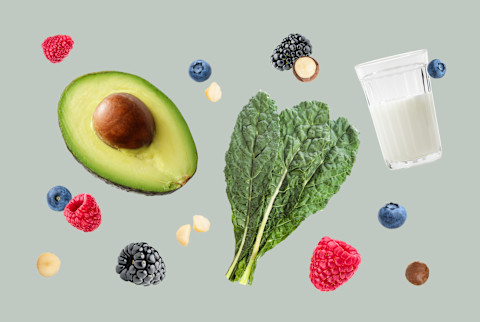5 Gut-Supporting Foods You Should Definitely Be Eating On A Keto Diet

The ketogenic diet is one of the most popular styles of eating at the moment, with countless followers and experts touting its benefits. But is it legit? As an integrative gastroenterologist, I always like to remind people that what matters the most when assessing a diet's potential for promoting health is the effect it has on the gut microbiome—the ecosystem of bacteria, viruses, and fungi that live inside our digestive tract and affect countless bodily functions.
What we know about keto and the gut.
The ketogenic diet is a fat-focused, significantly carb-restricted diet—and while this can be a good way to lose weight by shifting your body to use fat as an energy source rather than glucose, many people believe that higher fat diets reduce microbial diversity in the gut. But the research actually isn't clear-cut on this. A recent study1 showed that in patients with multiple sclerosis, concentrations and diversity of certain populations of bacteria were reduced. When these patients were then placed on a ketogenic diet, the bacterial concentrations were further reduced (generally, not a good thing). However, the patients started to recover after three months on a keto diet, and after six months, the concentrations of the microbes normalized, meaning, in some instances, keto could actually be a tool to help rebalance the gut.
Another study2 showed that the ketogenic diet could significantly modify symptoms of epilepsy and reshape the gut microbiome of infants with the condition, and it's also been suggested3 (using an animal model) that the ketogenic diet may reduce some of the neurological symptoms associated with autism spectrum disorder as a result of changes to the gut microbiome.
While there are some human studies demonstrating negative impacts of the keto diet on the gut microbiome, many of these studies involve small sample sizes and may even include people with certain metabolic problems, making it hard to generalize to everyone. It's also important to try to define what kinds and sources of fats are being used in certain studies—many studies don't specify this, but it could make all the difference in the outcome. For example, avocado, salmon, and olive oil are all quality fat sources that may help reduce inflammation throughout the body, including in the gut, while pork rinds and processed meats can be pro-inflammatory and promote intestinal permeability (aka leaky gut).
Keto-friendly foods that support gut health.
So, in the end, we know there is some data supportive of the ketogenic diet. In certain circumstances, I like to bring up to patients a ketogenic diet that's higher in nourishing plant-based foods and healthy fats and lower in meats and pro-inflammatory fats than most mainstream approaches.
We also know that much of the benefit from the ketogenic diet occurs from changes in the gut microbiome. Therefore, if you're going to try keto, it makes the most sense to eat foods that will keep you in ketosis while simultaneously providing you with great gut support.
To help you out, I put together a list of my top five gut-friendly foods that help you reap the benefits of ketosis while making sure your microbes are well nourished:
Avocados
This superfood is packed with nutrients, vitamins, and phytochemicals that have been linked to cardiovascular benefits. They also contain fiber (one medium avocado has 9 grams of fiber, or 35 percent of your recommended daily intake), which helps feed the trillions of bacteria in the gut.
Macadamia nuts
In general, nuts are a good source of fiber and healthy fats. They have a prebiotic effect4 on the microbiome as well, meaning they help feed beneficial probiotic bacteria. Consuming nuts is also associated with increased production of butyrate, a short-chain fatty acid that helps heal the gut and reduce inflammation. A few macadamia nuts (which are higher in fat than most other nuts) will be filling, healthy, and help curb cravings for unhealthy fare.
Kale
Kale is a low-carb, high-fiber cruciferous vegetable, which is totally acceptable on keto. Cruciferous veggies have been associated with reduced cancer risk through the metabolism of glucosinolates (a natural plant compound) by the gut microbiome.
Kefir
In small amounts, kefir is an acceptable fermented beverage packed with gut-friendly probiotics. Just make sure to avoid kefir with added sugar and flavorings; plain, full-fat varieties have the most benefit. And remember, not all kefir has to come from cow's milk. Some people, for example, have an easier time digesting goat milk kefir.
Berries
The glycemic load of berries is low enough that they can be enjoyed on a ketogenic diet. These are also a great source of fiber, which your microbes need to prosper. Raspberries have a whopping 8 grams of fiber (32 percent of your recommended daily intake) in 1 cup. Additionally, berries support5 healthy aging, inflammatory markers, and gut health with their wide range of phytonutrients.
